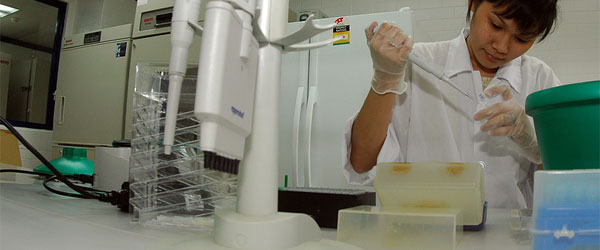The prospect of going into an interview for a life sciences postdoctoral position can be quite unnerving; however, in my experience, the same sorts of questions come up time and time again. So, it is highly worthwhile doing some preparation for potential postdoc interview questions. Doing this, as well as some investigative work into the research group and PI, can really give you the edge in securing that postdoc.
The following 10 questions are some that I have encountered multiple times during the job-hunting process. On a couple of occasions, the interviewing panel has forwarded the questions to me in advance. In such cases, there is no excuse not to have answers prepared.
10 Popular Postdoc Interview Questions
1. Tell Us About Yourself
This is a really common opener in interviews. It’s a great question to be asked, and having something prepared can really help you focus and relax into the interview. However, you need to make sure your answer is relevant to the position you’re interviewing for.
Start from your current or most recent position, whether you’re a PhD student or already a postdoc, and work back from there. You also want to briefly discuss where you see yourself going. What you say here might direct the next few questions.
It’s probably best to keep your answer professional, but that doesn’t mean that you can’t touch on your personal life if you think it’s relevant: Where did your love of science come from, for example? How did you end up in this field?
2. What is Your Career Plan? / Where Do You See Yourself in 5 Years’ Time? / What Are the Professional Goals You Are Seeking in this Position and How Will You Go about Seeking the Funding, Students, and Equipment to Achieve these Goals?
If you have applied for an academic postdoctoral position, you really need to get across that your aim is to become an independent scientist. You could start off with something like:
This position will allow me to build on my existing research skills and develop as an independent scientist by acquiring new techniques, additional project management skills, publications, and funding grants.
Then, expand on what you have achieved to date and how you would go about furthering your career, i.e., applying for research grants, assisting in student supervision, and gaining new publications.
3. What is Your Current Position and Your Research Background to Date, Including Your Publications and Your Experience in (Cancer) Research?
If you have been called for an interview, your CV/resume has already impressed the interview panel. The postdoc interview questions offer a chance for you to sell yourself and highlight the most relevant experience to the job in question.
You may have applied for a position in a field different from what you have worked in previously. For example, your PhD may have been carried out in an arthritis research group, but you have applied for a postdoc in a cancer group. The important thing is to focus on the similarities between the two fields of research. You could start by stating:
I haven’t worked for a cancer research group, but there are similarities between the processes that lead to the development of arthritis and cancer, such as angiogenesis, cell migration, cell invasion, and ECM degradation. I have extensive experience in studying these processes using various lab techniques.
4. What Specific Techniques Have You Used for Your Experiments to Date?
Answering this question requires a similar strategy as for the previous question. You may not have experience in all the laboratory techniques listed in the job description, but highlight the ones you do have experience in. For those who have little or no experience, highlight your technical ability and emphasize that you are highly capable of learning new techniques.
5. What Do You Understand about the Job Description / What Would Your Proposed Research Directions Be if You Were the Successful Candidate?
In your own words, summarize the details of the advertised postdoc. Follow on with some examples of how you would like to expand on the research and develop projects of your own within the group.
Focus on what you can bring to the group, i.e. experience in particular techniques not currently used within the group. Your prospective boss may wish to take advantage of your PCR skills and get the technique up and running in their group. Or is there an opportunity to set up a scientific special interest group?
6. Have You Had any Experience Supervising Postgraduate Students? / How Can You Demonstrate Your Leadership Skills?
Don’t worry if you haven’t supervised a Master’s student from start to finish. List any experience. Discuss how you taught a summer student a technique or were the person in charge when your senior scientist was away at a conference. State that you have developed leadership skills over the course of your career and that you feel confident in leading projects.
7. Can You Work in a Group or Do You Prefer Working on Your Own?
This requirement can vary from postdoc to postdoc, so be careful when answering. A PI may need a postdoc who is happy to work autonomously on a specific project or an individual who can help lead and coordinate a team. Refer to the job description in your answer.
8. Can You Give an Example of When You Have Shown Initiative?
You could refer to the time you suggested setting up a dedicated molecular biology workspace in the lab or canvassing a science rep for a discount.
The panel might be interested in whether you can think creatively to solve particular problems or whether you’re happy to work independently. Again, you’ll need to tailor your answer to the particular postdoc.
9. What Are Your Best and Worst Qualities? / What Are Your Strengths and Weaknesses?
Postdoc interview questions on strengths and weaknesses are highly likely, so they’re the kinds of questions you really want to think about. Bear in mind that it matters as much how you answer as what you actually say.
Be honest. If you know you struggle with presenting, or a particular technique, for example, admit it, but then discuss what you’ve done to address this. The committee is trying to learn about your personal qualities: Are you honest? Are you willing to learn? How well do you deal with feedback?
10. What Additional Role Could You Play in the Lab/Department?
This is where you can outline why you, rather than anyone else the panel might be interviewing, are best for this job. What skills and qualities will you bring to the postdoc? Tailor this answer really closely to the role. Think about how you might complement/strengthen the existing team; are there any techniques that you’ve mastered that you can teach the lab?
At the end of the day, remember that you are interviewing the panel as much as they are interviewing you. You also need to think about any questions that you wish to ask the interview panel. This shows that you have done your research and that you are serious about the position.
FAQs
Q: How can I effectively negotiate postdoc offers, including salary and benefits?
A: When it comes to negotiating postdoc offers, including salary and benefits, it’s essential to approach the process with a clear understanding of the norms within your field and the specific institution.
Gather information on average postdoc salaries and benefits in their discipline and region to have a benchmark.
It’s also important to communicate your value and potential contributions to the team while being open to finding common ground with your potential employer.
Negotiation is not just about salary—it can also include discussions about resources, equipment, conference support, and professional development opportunities.
Q: How should I handle questions about long-term career plans, especially if I’m uncertain or considering paths outside of academia?
A: Addressing questions about long-term career plans, especially if you are uncertain or considering non-academic paths, requires a nuanced approach.
While you want to be honest, it’s also crucial to emphasize your commitment to contributing to the research and goals of the lab.
You can acknowledge your interest in exploring diverse career avenues while highlighting how the skills and knowledge you will gain in the postdoc position are valuable across various sectors.
This demonstrates your adaptability and long-term vision, which are usually attractive qualities to potential employers.
Q: What are the expectations for postdocs regarding publishing and grant writing, and how can I demonstrate my potential to meet these expectations during the interview?
A: Regarding expectations for publishing and grant writing, you should be prepared to discuss your previous experiences and future strategies.
Demonstrating an understanding of the publication process, from conducting research to manuscript preparation and submission, is vital. Additionally, showing awareness of grant opportunities and expressing eagerness to learn and contribute to grant writing reflects your initiative and commitment to contributing to the lab’s success.
Sharing specific examples of your involvement in these areas can provide concrete evidence of your capabilities and potential as a valuable team member.
We hope you found these sample questions useful and good luck in your interview!
What are your top tips for answering postdoc interview questions? What questions have you been asked in your interviews? Feel free to share them in the comments section below.
Originally published March 18, 2013. Reviewed and updated in December 2020 and April 2024.







